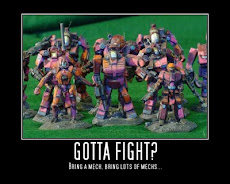 |
| Work in Progress: not glued together, which is why the gun barrel is on the ground. |
 |
| Work in Progress: showing barrel fabrication. |
As you can see I took a backpack from a Stone Mason twin-set which I had bought a while ago from Dream Pod 9, when you could only get the Stone Mason in pairs. So, this leaves me short for making up the other model.
 |
| Look at this lovely, pity it was the wrong type of recoilless rifle. |
I started to make up a recoilless rifle using a Dream Pod 9 part, called a very light field gun. I even added exhaust ports. I was feeling very pleased with the work, but thought the barrel was a tad long and needed shortening. Which I did.
However, I'd forgotten what I wrote in my novel, wrongly remembering I'd said she used a recoilless rifle, whereas in fact I wrote recoilless gauss rifle.
The gauss being the important part of the description.
There was some cursing. A gauss rifle is an entirely different beastie, and more to the point a design that I have already made on two previous occasions.
Moving on.
After discussions with Fritz, one of my specialist Beta readers, I realized I needed to think more about Corpsman Keith's role. As a result, I'm putting him in a Corpsman's combat armour suit , which will appear in book five; Dead Dogs (provisional title). So I've started to make up Marine Engineer combat armour suit, which I've teased elsewhere.
Before then though, I need to finish writing Two Moons, which has an Army engineering combat armour suit, which I'm also currently designing.
More will be revealed in due course.
NB: You can see how the models are used to inspire the cover art for my novels here.













.png)





